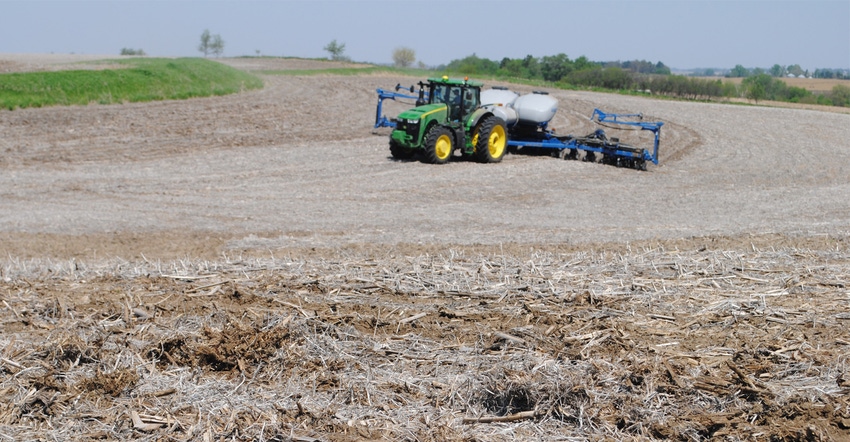January 11, 2021

The 2021 version of the popular Nebraska crop production clinics will feature research updates and information tailored to regional crop issues and grower interests in a new online format this year.
The sessions, which will be hosted via Zoom, will cover a wide range of topics, including cropping system management, soil nutrition, irrigation, pest management, ag technology and agribusiness management.
All sessions run from 8:45 a.m. to 3:15 p.m. Initial sessions for western, central and eastern Nebraska were hosted during the first week of January.
Remaining sessions and dates include western Nebraska-focused clinics set for Jan. 12 and 19. Central Nebraska-focused clinics are set for Jan. 13 and 20. Eastern Nebraska-focused clinics are scheduled for Jan. 14 and 21.
There will be a limited opportunity to view the presentations in person at various county locations, depending on local COVID-19-directed health measures. All in-person attendees must follow University of Nebraska-Lincoln guidelines for face masks and social distancing.
"Individual clinics will be customized to address topics specific to that area of the state, allowing growers to get research-based information on the issues they face locally," says Chris Proctor, UNL weed management Extension educator and clinic coordinator.
For example, the eastern Nebraska programs will include information on "Industrial hemp tolerance to three early-post and late-post herbicides,” and in western Nebraska, topics include, "Managing Palmer amaranth in dry edible beans without Reflex.”
Sponsored by Nebraska Extension, the clinics will enable commercial and noncommercial pesticide applicators to renew licenses for ag plant and demonstration/research, and private pesticide applicators also will be able to renew their licenses.
Certified crop adviser credits will be available in the areas of crop production, nutrient management, integrated pest management, water management and professional development.
Registration for the clinics is required and costs $80. Program agendas, online registration for each site and information on in-person viewing is available at agronomy.unl.edu/cpc. Visa, Mastercard and Discover are accepted online.
Free soybean gall midge webinars continue
Since 2018, soybean gall midge has expanded its range, claiming eight new counties in Nebraska in 2020. With its aggressive spread, Midwestern producers are encouraged to attend a three-part webinar series featuring the latest information on this invading soybean pest.
The University of Nebraska-Lincoln, in conjunction with Iowa State University and University of Minnesota, will be hosting live sessions in January to educate ag producers and professionals on the biological and ecological impacts of soybean gall midge, as well as scouting, identification and management techniques.
One session on soybean gall midge identification, distribution and look-alikes was held Jan. 5. Remaining sessions include one on soybean gall midge ecology and plant injury from 11 a.m. to noon Jan. 12; and a session on management and challenges facing producers set for 11 a.m. to noon Jan. 19.
Professionals from four regional universities are expected to present information during this webinar, including Justin McMechan, UNL Extension crop protection and cropping systems specialist; Erin Hodgson, Iowa State University professor and Extension entomologist; Robert Wright, UNL professor and Extension entomology specialist; Robert Koch, University of Minnesota associate professor and Extension entomologist; Bruce Potter, University of Minnesota Southwest Research and Outreach Center Extension IPM specialist; and Tom Hunt, UNL Haskell Agricultural Laboratory professor and Extension entomology specialist.
The webinar is free to attend, but registration is required. Sessions will be recorded for on-demand viewing. Residents in Nebraska, Iowa, Minnesota and South Dakota can earn one CCA credit per session of this webinar series.
“For Nebraska soybean growers, the battle with soybean gall midge is not going to end anytime soon,” McMechan says. “From this past year, field surveys found that a number of our historically infested counties showed significant field injury levels from this new pest.
“This soybean gall midge discussion series is a real opportunity for growers and ag professionals to get the latest information on identification, scouting and management,” he says. “It's also an opportunity to voice concerns, ask questions, and learn from others who are dealing with this new threat.”
Farmers can register to attend the sessions by going online at umn.zoom.us.
Source: UNL CropWatch, which is solely responsible for information provided and is wholly owned by the source. Informa Business Media and all its subsidiaries are not responsible for any of the content contained in this information asset.
Read more about:
Covid 19You May Also Like




